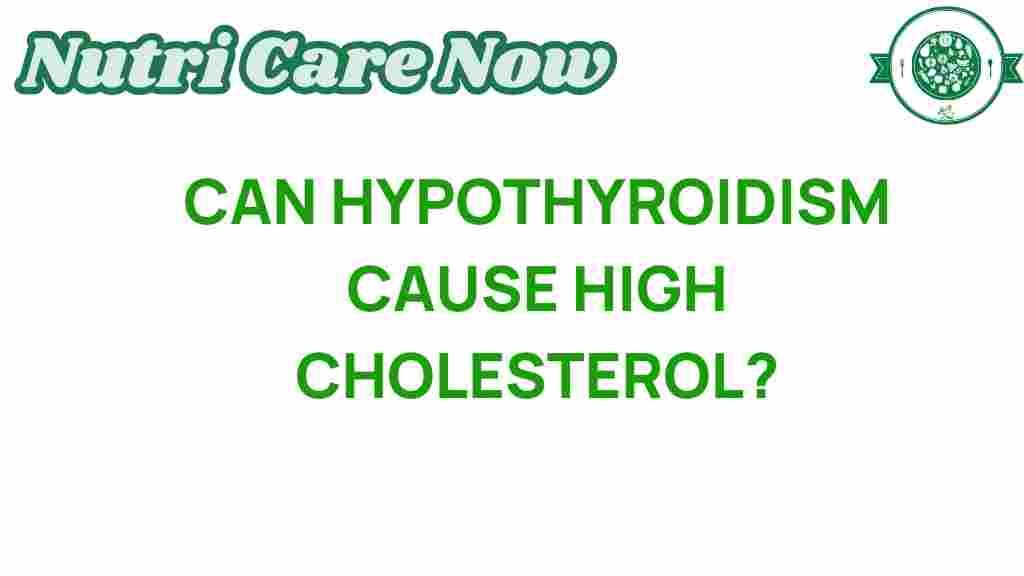Unraveling the Link Between Hypothyroidism and High Cholesterol
Hypothyroidism is a condition where the thyroid gland does not produce enough thyroid hormones, leading to a myriad of health issues, including high cholesterol. Understanding the connection between hypothyroidism and high cholesterol is crucial for maintaining overall thyroid health and managing cholesterol levels. This article delves into the complexities of the endocrine system, explores how thyroid function affects lipid profiles, and discusses the health implications of these metabolic disorders.
Understanding Hypothyroidism
Hypothyroidism is a common endocrine disorder characterized by insufficient production of thyroid hormones, primarily thyroxine (T4) and triiodothyronine (T3). These hormones play a vital role in regulating metabolism, energy levels, and overall bodily functions. When thyroid function is compromised, it can lead to various metabolic disorders, including:
- Weight gain
- Fatigue
- Depression
- Cold intolerance
- Dry skin and hair
How Hypothyroidism Affects Cholesterol Levels
The relationship between hypothyroidism and high cholesterol is well-documented. Here’s how low thyroid hormone levels can lead to increased cholesterol levels:
- Decreased Lipid Metabolism: Thyroid hormones are crucial for lipid metabolism. Low levels of these hormones slow down the body’s ability to process and eliminate cholesterol, resulting in elevated levels.
- Increased LDL Cholesterol: Hypothyroidism is associated with higher levels of low-density lipoprotein (LDL) cholesterol, often referred to as “bad” cholesterol, which can lead to cardiovascular issues.
- Impaired Bile Acid Production: Thyroid hormones stimulate bile acid production in the liver, which is essential for fat digestion. A deficiency can hinder bile production, further exacerbating cholesterol issues.
Assessing Thyroid Function and Cholesterol Levels
Monitoring thyroid function is essential for individuals with high cholesterol, as untreated hypothyroidism can worsen lipid profiles. Key tests to assess thyroid function include:
- TSH Test: Measures thyroid-stimulating hormone levels to determine if the thyroid is underactive.
- T4 and T3 Tests: Assess levels of thyroxine and triiodothyronine in the blood.
- Lipid Profile: Evaluates cholesterol levels, including total cholesterol, LDL, HDL (high-density lipoprotein), and triglycerides.
Regular screening for thyroid function and cholesterol levels is vital for anyone diagnosed with metabolic disorders or at risk for cardiovascular diseases.
Health Implications of High Cholesterol
High cholesterol can lead to significant health implications, especially when associated with hypothyroidism. Some of the most critical health risks include:
- Cardiovascular Disease: Elevated LDL cholesterol increases the risk of heart attacks and strokes.
- Atherosclerosis: High cholesterol contributes to the hardening and narrowing of arteries, leading to reduced blood flow.
- Peripheral Artery Disease: Poor circulation due to high cholesterol can affect blood flow to the limbs, causing pain and mobility issues.
Addressing both hypothyroidism and high cholesterol is essential in reducing these health risks.
Managing Hypothyroidism and High Cholesterol
Managing hypothyroidism and its impact on cholesterol levels involves a combination of medical treatment and lifestyle changes:
1. Medical Treatment
Individuals diagnosed with hypothyroidism typically receive hormone replacement therapy, such as:
- Levothyroxine: A synthetic form of T4, this medication helps restore normal thyroid hormone levels and can positively influence cholesterol levels.
2. Lifestyle Modifications
In addition to medication, the following lifestyle changes can help manage both thyroid health and cholesterol levels:
- Healthy Diet: Incorporate a diet rich in fruits, vegetables, whole grains, and healthy fats. Foods high in fiber can help lower cholesterol levels.
- Regular Exercise: Physical activity can improve cholesterol levels and support thyroid function. Aim for at least 150 minutes of moderate exercise each week.
- Avoiding Trans Fats: Limit the intake of trans fats, found in many processed foods, as they can raise LDL cholesterol levels.
- Regular Monitoring: Keep track of thyroid hormone levels and cholesterol levels through regular check-ups with your healthcare provider.
Troubleshooting Tips for Managing Cholesterol with Hypothyroidism
If you’re managing hypothyroidism and high cholesterol, consider the following troubleshooting tips:
- Follow Your Treatment Plan: Ensure you take any prescribed medications as directed and follow up with your healthcare provider regularly.
- Discuss Supplements: Some supplements, such as omega-3 fatty acids, may help lower cholesterol. Consult your doctor before starting any new supplements.
- Monitor Your Symptoms: Keep a record of any new symptoms or changes in your health, and discuss these with your healthcare provider.
- Stay Informed: Educate yourself about hypothyroidism and cholesterol management. Resources like the American Thyroid Association can provide valuable information.
Conclusion
The intricate link between hypothyroidism and high cholesterol highlights the importance of maintaining thyroid health for overall well-being. By understanding how thyroid function affects cholesterol levels, individuals can take proactive steps to manage their health. Regular monitoring, appropriate medical treatment, and lifestyle modifications are essential in addressing both conditions effectively.
For those experiencing symptoms of hypothyroidism or high cholesterol, consulting with healthcare professionals is critical. Early diagnosis and intervention can significantly improve outcomes and reduce associated health risks.
For more information on thyroid health and cholesterol management, visit the National Institutes of Health for resources and guidelines.
This article is in the category Health and created by NutriCareNow Team

2 thoughts on “Unraveling the Link Between Hypothyroidism and High Cholesterol”